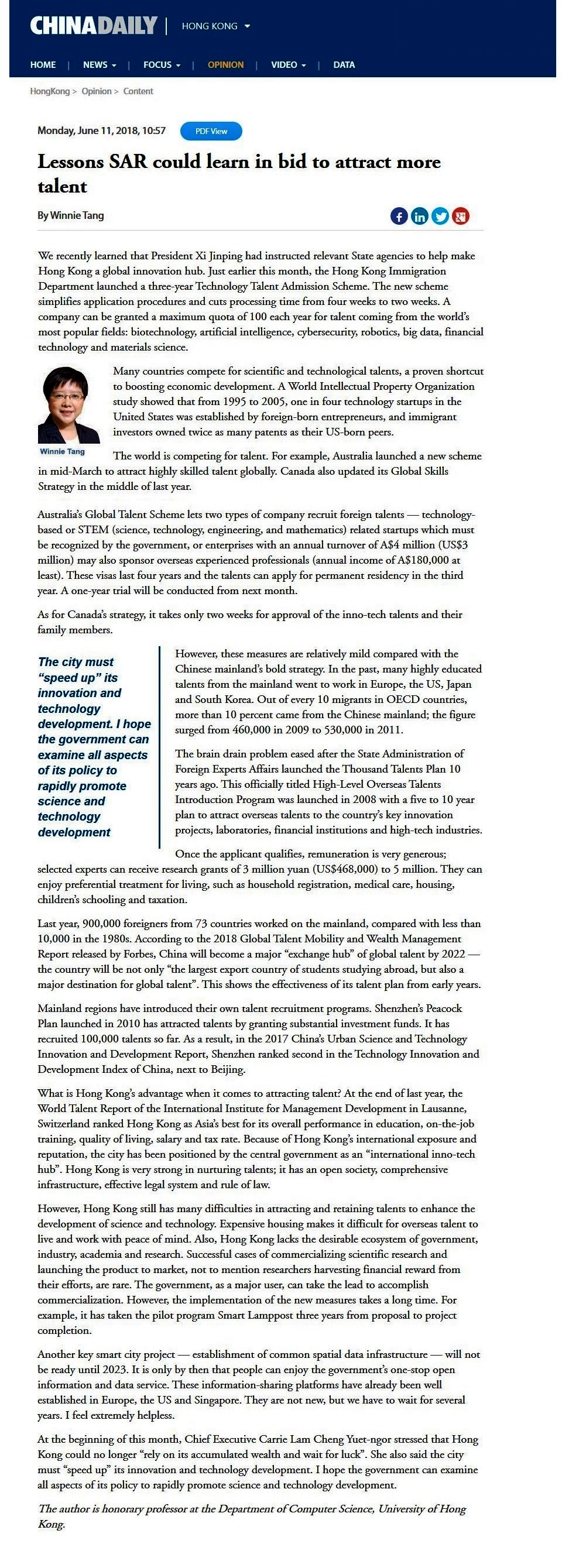網上版請按此

Lessons SAR could learn in bid to attract more talent
We recently learned that President Xi Jinping had instructed relevant State agencies to help make Hong Kong a global innovation hub. Just earlier this month, the Hong Kong Immigration Department launched a three-year Technology Talent Admission Scheme. The new scheme simplifies application procedures and cuts processing time from four weeks to two weeks. A company can be granted a maximum quota of 100 each year for talent coming from the world's most popular fields: biotechnology, artificial intelligence, cybersecurity, robotics, big data, financial technology and materials science.
Many countries compete for scientific and technological talents, a proven shortcut to boosting economic development. A World Intellectual Property Organization study showed that from 1995 to 2005, one in four technology startups in the United States was established by foreign-born entrepreneurs, and immigrant investors owned twice as many patents as their US-born peers.
The world is competing for talent. For example, Australia launched a new scheme in mid-March to attract highly skilled talent globally. Canada also updated its Global Skills Strategy in the middle of last year.
Australia's Global Talent Scheme lets two types of company recruit foreign talents — technology-based or STEM (science, technology, engineering, and mathematics) related startups which must be recognized by the government, or enterprises with an annual turnover of A$4 million (US$3 million) may also sponsor overseas experienced professionals (annual income of A$180,000 at least). These visas last four years and the talents can apply for permanent residency in the third year. A one-year trial will be conducted from next month.
As for Canada's strategy, it takes only two weeks for approval of the inno-tech talents and their family members.
However, these measures are relatively mild compared with the Chinese mainland's bold strategy. In the past, many highly educated talents from the mainland went to work in Europe, the US, Japan and South Korea. Out of every 10 migrants in OECD countries, more than 10 percent came from the Chinese mainland; the figure surged from 460,000 in 2009 to 530,000 in 2011.
The brain drain problem eased after the State Administration of Foreign Experts Affairs launched the Thousand Talents Plan 10 years ago. This officially titled High-Level Overseas Talents Introduction Program was launched in 2008 with a five to 10 year plan to attract overseas talents to the country's key innovation projects, laboratories, financial institutions and high-tech industries.
Once the applicant qualifies, remuneration is very generous; selected experts can receive research grants of 3 million yuan (US$468,000) to 5 million. They can enjoy preferential treatment for living, such as household registration, medical care, housing, children's schooling and taxation.
Last year, 900,000 foreigners from 73 countries worked on the mainland, compared with less than 10,000 in the 1980s. According to the 2018 Global Talent Mobility and Wealth Management Report released by Forbes, China will become a major "exchange hub" of global talent by 2022 — the country will be not only "the largest export country of students studying abroad, but also a major destination for global talent". This shows the effectiveness of its talent plan from early years.
Mainland regions have introduced their own talent recruitment programs. Shenzhen's Peacock Plan launched in 2010 has attracted talents by granting substantial investment funds. It has recruited 100,000 talents so far. As a result, in the 2017 China's Urban Science and Technology Innovation and Development Report, Shenzhen ranked second in the Technology Innovation and Development Index of China, next to Beijing.
What is Hong Kong's advantage when it comes to attracting talent? At the end of last year, the World Talent Report of the International Institute for Management Development in Lausanne, Switzerland ranked Hong Kong as Asia's best for its overall performance in education, on-the-job training, quality of living, salary and tax rate. Because of Hong Kong's international exposure and reputation, the city has been positioned by the central government as an "international inno-tech hub". Hong Kong is very strong in nurturing talents; it has an open society, comprehensive infrastructure, effective legal system and rule of law.
However, Hong Kong still has many difficulties in attracting and retaining talents to enhance the development of science and technology. Expensive housing makes it difficult for overseas talent to live and work with peace of mind. Also, Hong Kong lacks the desirable ecosystem of government, industry, academia and research. Successful cases of commercializing scientific research and launching the product to market, not to mention researchers harvesting financial reward from their efforts, are rare. The government, as a major user, can take the lead to accomplish commercialization. However, the implementation of the new measures takes a long time. For example, it has taken the pilot program Smart Lamppost three years from proposal to project completion.
Another key smart city project — establishment of common spatial data infrastructure — will not be ready until 2023. It is only by then that people can enjoy the government's one-stop open information and data service. These information-sharing platforms have already been well established in Europe, the US and Singapore. They are not new, but we have to wait for several years. I feel extremely helpless.
At the beginning of this month, Chief Executive Carrie Lam Cheng Yuet-ngor stressed that Hong Kong could no longer "rely on its accumulated wealth and wait for luck". She also said the city must "speed up" its innovation and technology development. I hope the government can examine all aspects of its policy to rapidly promote science and technology development.
Dr. Winnie Tang
Honorary professor, the Department of Computer Science at the University of Hong Kong